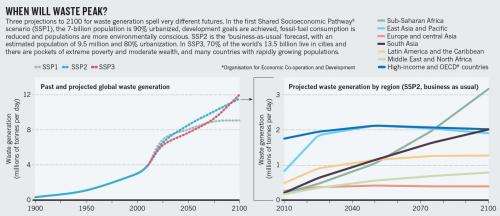October 31, 2013 report
Concerned researchers project global solid waste to peak at 11 million tons per day in 2100

(Phys.org) —Daniel Hoornweg associate professor at the University of Ontario, Perinaz Bhada-Tata a Dubai based solid-waste consultant, and Chris Kennedy a professor at the University of Toronto, have together published a COMMENT piece in the journal Nature suggesting that the total amount of solid waste we humans generate will peak in 2100 at approximately 11 million tons per day—close to three times the amount produced today.
Reports of global warming have dominated the headlines in the past few years, leaving little room for other environmental concerns, one of which is the mounting problem of solid waste, aka trash or rubbish—it's the stuff we toss after opening packages or consume most any food. It's plastic water bottles and food scraps, old cell phones or junk mail. Some of it is recycled of course, but a lot of it still ends up in landfills. In their comment piece the researchers write that scientists have found that people that live in more affluent countries toss more stuff in the trash than do people in poor places. They also found that there is a peak amount for trash tossed in affluent places—at some point, people begin spending some of their money on experiences, rather than just stuff. That's enough information, they say, to project how much total trash will be tossed at various points in the future, and when a global peak will be reached. It's all based on population growth, the number of people living in developing countries and the amount of time economists and others project will pass before everyone is living in a developed country.
What's perhaps most interesting in the report is the authors' contention that it's not the trash itself that is the real concern (recycling, burial, etc. should be able to handle all that trash) but what it represents in terms of other impacts on the planet. As people gain wealth, they pollute more in general—if all the poor people today become affluent to the point of reaching peak trash production, it means they will all be responsible for producing as much CO2 for example, as those that are affluent today, or for the amount of nitrogen that flows to the sea to produce the food they eat.
The authors also contend that their projected numbers are not set in stone, if we so desire we can change the way we live and in so doing reduce the amount of trash we produce. They note that people in Japan for example produce much less trash per person than most anywhere else—they have little choice, governments there regulate how people dispose of trash because there is so little room for landfills.
More information: Waste production must peak this century, Nature 502, 615–617 (31 October 2013) DOI: 10.1038/502615a
Journal information: Nature
© 2013 Phys.org
















